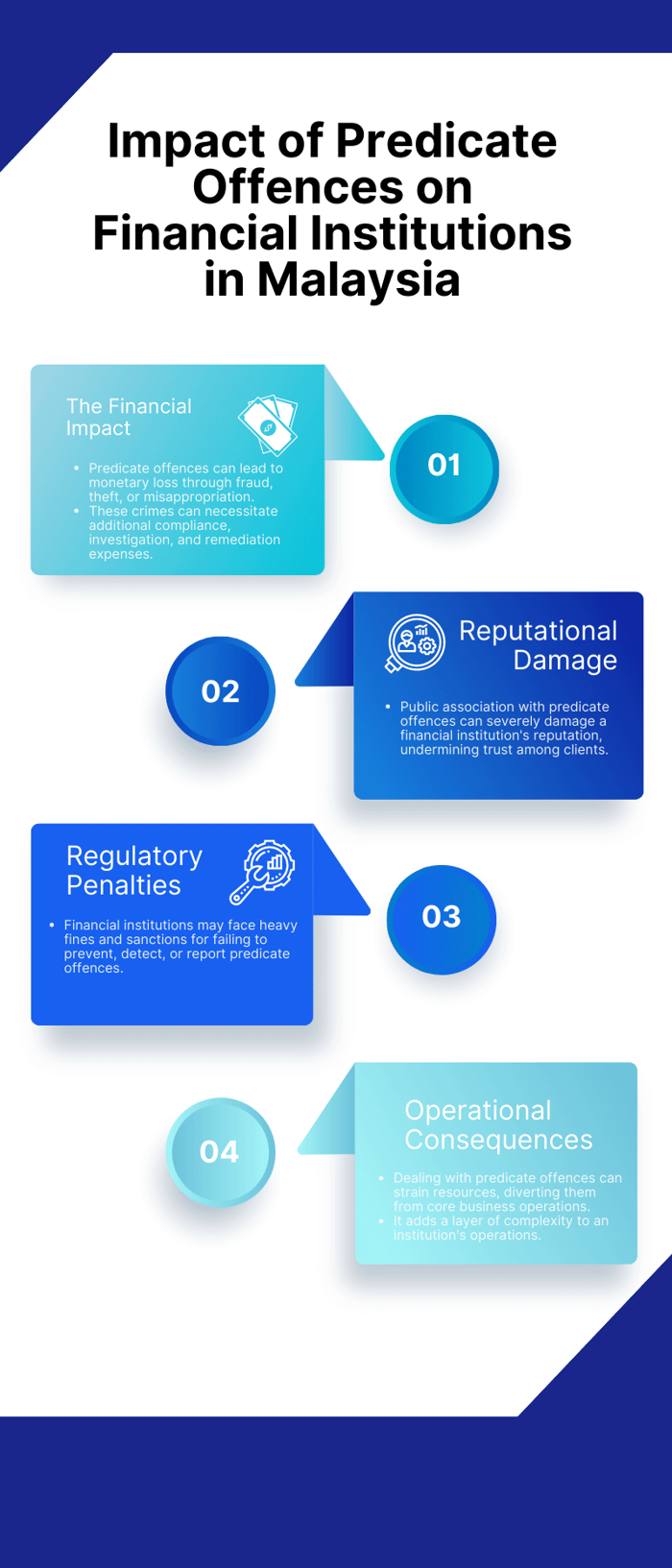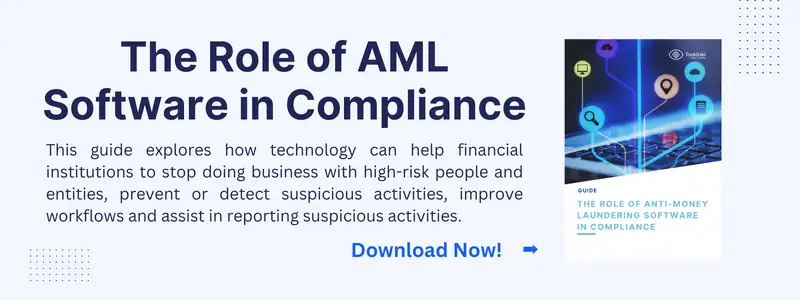Predicate crimes, often referred to as 'predicate offences', are criminal activities that generate illicit funds, which are then laundered through the financial system. These crimes can include but are not limited to, drug trafficking, fraud, corruption, and tax evasion. Proliferation financing, on the other hand, pertains to the act of providing funds or financial services that contribute to the development, production, or acquisition of nuclear, chemical, or biological weapons and their delivery systems. These activities pose significant threats not only to financial institutions but also to national security.
In Malaysia, as in other countries, financial institutions are obliged to implement robust measures to prevent their systems from being used as conduits for money laundering from predicate crimes and proliferation financing. This responsibility is crucial considering the strategic position of Malaysia in Southeast Asia and its growing economy, which may attract illicit activities. However, these illicit activities' dynamic and intricate nature poses a significant challenge for financial institutions.
Effective management of these risks necessitates a comprehensive understanding of predicate offences and proliferation financing and the employment of advanced solutions to detect and mitigate them.
Understanding Predicate Offences
Definition and Examples of Predicate Offences
Predicate offences refer to the array of criminal activities that precede the act of money laundering. In simpler terms, these are the unlawful acts from which the money or assets being laundered originally derived. These crimes encompass a broad range of illicit activities, including, but not limited to, fraud, corruption, drug trafficking, organised crime, human trafficking, and tax evasion.
Each of these offences represents a source of dirty money, which criminals then seek to launder and integrate into the legitimate financial system, thus obscuring the illicit origins of the funds.

Proliferation Financing in Malaysia
Explanation of Proliferation Financing
Proliferation financing refers to the act of providing funds or financial services that are used in the trade, manufacture, or use of weapons of mass destruction (WMD) and their delivery systems. It's about financing nuclear, chemical, or biological weapons and the technology and materials used in their production. This includes any financial activity that supports the development or acquisition of such weapons and related goods and technologies, particularly in violation of international sanctions.
According to the latest proliferation financing risk assessment report, Malaysia’s net risk for PF is determined to be at a medium-low level, taking into account a medium-low level of overall inherent risks (threats, vulnerabilities and likelihood of occurrences) and an acceptable level of control measures.
How Proliferation Financing Affects the Malaysian Financial Sector
The implications of proliferation financing on the Malaysian financial sector are significant. First, financial institutions can inadvertently become involved in transactions related to WMD proliferation, presenting substantial legal and reputational risks. If found to be in violation of international sanctions, institutions may face heavy fines, restrictive measures, or even criminal charges.
Additionally, the potential harm from proliferation financing is enormous, given that it contributes to the production and dissemination of WMDs, posing existential threats to human society. From a reputational perspective, any association with such activities can lead to a loss of customer trust, investor confidence and damage to the institution's brand and image.
Also, from a compliance perspective, proliferation financing poses unique challenges. Given WMD-related transactions' complex and often opaque nature, financial institutions may struggle to identify and intercept these transactions effectively. The global nature of these transactions also means that institutions must understand and adhere to not just domestic regulations but also a complex web of international sanctions and regulations. Therefore, robust anti-money laundering and counter-terrorism financing (AML/CTF) systems are crucial in detecting and preventing proliferation financing.
Regulatory Landscape in Malaysia
Overview of Malaysia's AML/CFT regulations
Malaysia has a comprehensive and robust Anti-Money Laundering and Counter-Terrorism Financing (AML/CFT) regulatory framework. This framework is underpinned by the Anti-Money Laundering, Anti-Terrorism Financing and Proceeds of Unlawful Activities Act 2001 (AMLA), which was updated in 2014 to incorporate international standards.
Read More: The Evolution of AML Compliance Regulations in Malaysia
Under AMLA, financial institutions are required to undertake customer due diligence, maintain comprehensive records, implement ongoing monitoring procedures, and promptly report any suspicious transactions to the Financial Intelligence and Enforcement Department of the Central Bank of Malaysia (Bank Negara Malaysia).
In addition to AMLA, financial institutions must adhere to guidelines and policy documents provided by Bank Negara Malaysia. These guidelines cover risk management and internal control systems, training and awareness programs, and specific reporting requirements.
How These Regulations Address Predicate Offences and Proliferation Financing
To address the risks posed by predicate offences and proliferation financing, Malaysian AML/CFT regulations demand that financial institutions have systems in place to identify, assess, and understand these risks. These systems must be commensurate with the nature and size of their businesses.
In terms of predicate offences, financial institutions are required to conduct enhanced due diligence on customers who are politically exposed persons (PEPs) or who have been convicted of a serious offence. They must also be vigilant in identifying transactions linked to predicate offences such as drug trafficking, corruption, and fraud.
When it comes to proliferation financing, the regulations require financial institutions to implement targeted financial sanctions related to WMD proliferation, as stipulated by the United Nations Security Council Resolutions. They are required to freeze without delay the funds or assets of, and to ensure that no funds or assets are made available, directly or indirectly, to or for the benefit of any person or entity designated by the UN or under domestic legislation.
Therefore, Malaysia's regulatory landscape necessitates compliance and encourages proactive measures to combat the threats of predicate offences and proliferation financing.
Role of AML Solutions in Addressing Predicate Offences and Proliferation Financing
AML solutions, particularly those that leverage advanced technologies like artificial intelligence (AI) and machine learning (ML), are critical tools in detecting and preventing predicate offences and proliferation financing. These solutions can sift through vast amounts of data to identify patterns, trends, and anomalies that could signify illegal activities.
Advanced AML solutions can conduct a thorough customer risk assessment, allowing financial institutions to better understand their customers' risk profile. This includes enhanced due diligence for high-risk customers, which is particularly important in the context of predicate offences.
When it comes to proliferation financing, AML solutions can monitor and analyze transactions in real time, flagging any transactions linked to designated entities or those that demonstrate suspicious patterns. This enables financial institutions to respond promptly to potential risks, freezing assets or blocking transactions as required.
Importance of Using Advanced AML Solutions for Compliance
Compliance with AML/CFT regulations is not just about adhering to the rules; it's about safeguarding the integrity of the financial institution and the financial system as a whole. Using advanced AML solutions is a proactive step that financial institutions can take to ensure they are not inadvertently facilitating illegal activities.
These solutions help financial institutions stay ahead of the evolving tactics used by criminals, enhancing their ability to detect and prevent predicate offences and proliferation financing. They also automate many of the manual processes associated with AML compliance, increasing efficiency and reducing the potential for human error.
Moreover, a strong AML compliance program, underpinned by advanced technology, can help financial institutions build trust with regulators, customers, and the wider public. It shows that the institution is committed to playing its part in combating financial crime and protecting the financial system's integrity.
Tookitaki’s Solution for Financial Crime Compliance
Tookitaki is a global leader in financial crime prevention, dedicated to building a safer and more secure world through innovative technology, strategic collaboration, and a distinctive community-based approach. Since our inception in 2015, we have been on a mission to transform the battle against financial crime by dismantling siloed AML approaches and uniting the community through our groundbreaking Anti-Money Laundering (AML) Suite and Anti-Financial Crime (AFC) Ecosystem.
Our AMLS is an end-to-end operating system that modernises compliance processes for banks and fintechs, providing comprehensive risk coverage, enhanced detection accuracy, and a significant reduction in false alerts. On the other hand, the AFC Ecosystem is a community of experts dedicated to uncovering hidden money trails that traditional methods cannot detect. Powered by federated machine learning, the AMLS collaborates with the AFC Ecosystem to ensure that financial institutions stay ahead of the curve in their AML programs.
The AML Suite is an end-to-end operating system that modernises compliance processes for banks and fintechs. It is redefining how the financial service industry thinks about and approaches AML compliance. It is an award-winning, self-adaptive machine learning solution that helps FIs to build a comprehensive risk-based anti-money laundering compliance program. It is an enterprise-wide solution built around three core modules: screening, risk scoring and transaction monitoring.
The AMLS platform has a modular design and consists of the following modules.
- Smart Screening solutions
- Prospect Screening
- Name Screening
- Transaction Screening
- Dynamic Risk Scoring
- Prospect Risk Scoring
- Customer Risk Scoring
- Transaction Monitoring
- Case Manager
How Tookitaki's Solution Can Help Malaysian Financial Institutions
Tookitaki’s AML Suite is designed to cater to Malaysian financial institutions' specific needs and regulatory environment. Its ability to continuously learn and adapt to evolving money laundering patterns makes it a powerful tool against predicate offences and proliferation financing.
Tookitaki's AMLS ensures that Malaysian financial institutions stay compliant with domestic AML/CFT regulations by offering robust controls and comprehensive coverage against illicit funds flow. It aids in complying with regulatory requirements to conduct thorough customer due diligence and risk assessments and to monitor transactions for suspicious activity.
Moreover, the solution reduces the burden of compliance by automating many manual processes associated with AML compliance, significantly reducing the operational cost and the potential for errors. The outcome is not just compliance with regulations but also enhanced protection against financial crime, preserving the integrity of institutions and the Malaysian financial system as a whole.
Summing Up and Taking the Next Step
Understanding predicate offences and proliferation financing and their implications for the financial sector is critical for Malaysian financial institutions. These forms of financial crime pose significant threats, not just to individual institutions but also to the integrity and stability of Malaysia's financial system. Ensuring robust measures to detect and prevent such illicit activities is essential to comply with AML/CFT regulations and to safeguard institutions from potential legal and reputational risks.
Financial institutions must embrace advanced technologies and tools to combat the increasingly sophisticated methods employed by money launderers. Tookitaki's Anti-Money Laundering Suite, with its innovative machine learning capabilities, provides a highly efficient and effective solution to manage these risks.
We encourage financial institutions to take a proactive approach to their AML compliance strategies. Book a demo of Tookitaki’s Anti-Money Laundering Suite today to understand how our solution can enhance your AML efforts and provide a shield against predicate offences and proliferation financing.
Anti-Financial Crime Compliance with Tookitaki?




